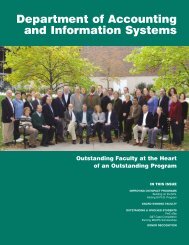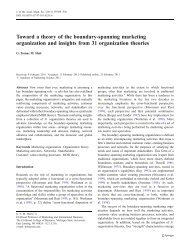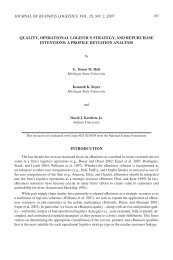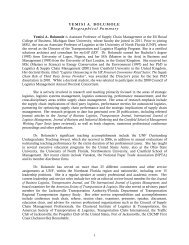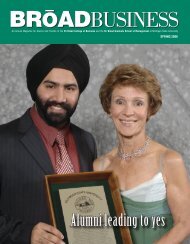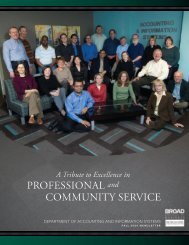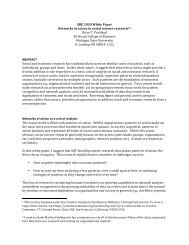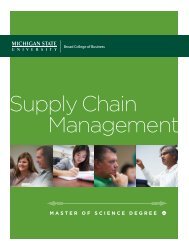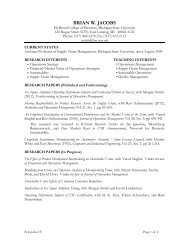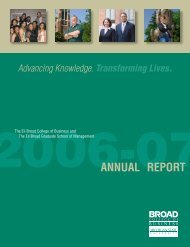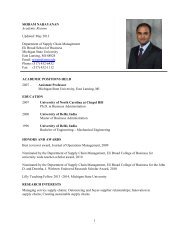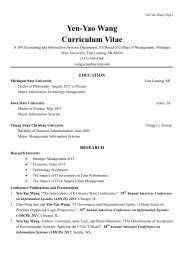Shan Yan - Broad College of Business - Michigan State University
Shan Yan - Broad College of Business - Michigan State University
Shan Yan - Broad College of Business - Michigan State University
You also want an ePaper? Increase the reach of your titles
YUMPU automatically turns print PDFs into web optimized ePapers that Google loves.
<strong>Shan</strong> <strong>Yan</strong>Department <strong>of</strong> FinancePhone: 517-420-4591(Mobile)Eli <strong>Broad</strong> <strong>College</strong> <strong>of</strong> <strong>Business</strong> Fax: 517-432-1080330 Eppley Center Email: yanshan@msu.eduEast Lansing, MI 48824EducationEli <strong>Broad</strong> <strong>College</strong> <strong>of</strong> <strong>Business</strong>, <strong>Michigan</strong> <strong>State</strong> <strong>University</strong>, East Lansing, MIPh.D. in Finance, Expected May 2012Department <strong>of</strong> Statistics and Probability, <strong>Michigan</strong> <strong>State</strong> <strong>University</strong>, East Lansing, MIPh.D. student in Statistics Fall 2006 – Summer 2007Eller <strong>College</strong> <strong>of</strong> Management, <strong>University</strong> <strong>of</strong> Arizona, Tucson, AZMA. in Economics Fall 2004 – Summer 2006<strong>College</strong> <strong>of</strong> Economics, Huazhong <strong>University</strong> <strong>of</strong> Science and Technology, Wuhan, ChinaM.A. in Econometrics Fall 2000 – Summer 2003B.A. in International Finance Fall 1996 – Summer 2000Research InterestsEmpirical Corporate Finance, Merger and Acquisition, Financial Intermediation, ManagerialOverconfidence, Textual Analysis, Corporate Governance, CEO Compensation, Hedge FundsTeaching InterestsCorporate Finance, Investment, International Finance, Financial Markets and Institutions, EmpiricalMethods in Finance and EconomicsWorking PapersManagerial Attitudes and Merger Outcomes: Evidence from Corporate TakeoverFilings (Job Market Paper)Abstract: We examine the textual content <strong>of</strong> merger and acquisition related SEC filings in an effort tounderstand the role <strong>of</strong> managerial attitudes and beliefs in merger negotiations and outcomes.Using a textual algorithm to identify the degree to which filings <strong>of</strong> bidders and targets exhibitnegative/cautious tones vs. positive/optimistic tones, we find that bidders employing themost optimistic language in their filings actually experience the worst long-run performancefollowing the transactions. In contrast, bidding managers who appear to acknowledge and understandthe risks <strong>of</strong> the transactions experience relatively better post-merger performance. Fortargets, we use the tone <strong>of</strong> their filings as a measure <strong>of</strong> how positive or negative their managementteams are towards the proposed transaction. We find that target filings are more negativefor deals with lower initial premiums, and that negative filings are associated with lower dealcompletion rates. For completed mergers, bidders are more likely to increase premia for resistanttargets. Thus our analysis <strong>of</strong> the textual content <strong>of</strong> merger filings appears to give us a newmethod for investigating the role <strong>of</strong> bidder and target attitudes and beliefs on merger outcomes.1
Bank Debt, Flexibility, and the Use <strong>of</strong> Proceeds from Asset Sales (with Ted Fee,Joshua Pierce, Hoontaek Seo)Abstract: In the theory <strong>of</strong> financial intermediation, bank debt is <strong>of</strong>ten characterized as being more readilyrenegotiable than public debt. Banks are also conjectured to gain valuable non-public informationthrough closer monitoring. Given these features, bank debt can theoretically be more flexible than publicdebt and can lead to better investment/liquidation decisions. We investigate this possibility using asample <strong>of</strong> firms facing the important decision <strong>of</strong> whether to reinvest the proceeds from asset sales orwhether to distribute the proceeds to debtholders. While higher levels <strong>of</strong> leverage are associated with anincreased probability <strong>of</strong> distributing proceeds to creditors, this relationship is significantly muted for bankdebt as opposed to public debt. This finding is consistent with the conjecture that bank debt providesenhanced flexibility when compared to public debt. Further we find that asset sale announcement periodabnormal stock returns are increasing in firms’ use <strong>of</strong> bank debt, but not public debt. This suggests thatmarket participants believe that banking relationships are leading to better decision making for thisparticular type <strong>of</strong> investment/liquidation decision. We find no significantly different effects <strong>of</strong> bank vs.public debt on the initial decision to undertake an asset sale in the first place. Thus, in the context <strong>of</strong> assetsales, the main observable difference arises in the use <strong>of</strong> proceeds decision, rather than the initial assetsale decision.How Hedge Funds' Alpha is Created (with Massimo Massa, Andrei Simonov)Abstract: We argue that hedge funds are able to take the opposite side <strong>of</strong> unpr<strong>of</strong>itable (for mutual fund)trades. Hedge funds exploit inefficiencies <strong>of</strong> mutual funds, especially domestic ones. We show that theperformance <strong>of</strong> hedge funds is significantly higher when mutual fund market coverage is higher. Thiseffect is mostly concentrated among domestic mutual funds and is stronger the higher the investmenthorizon <strong>of</strong> the hedge funds compared to mutual funds. Hedge funds are more likely to earn "alpha” in thepresence <strong>of</strong> a high degree <strong>of</strong> mutual fund market coverage and their probability <strong>of</strong> survival is higher. Thisis especially true for the alpha funds. The degree to which hedge funds react to changes in publicinformation (either analyst recommendations or EPS forecasts) is directly related to the degree <strong>of</strong> mutualfund market coverage.Teaching ExperienceInstructorDepartment <strong>of</strong> Finance, <strong>Michigan</strong> <strong>State</strong> <strong>University</strong>FI 312: Introduction to Investments, Summer 2011, Summer 2010, Summer 2009Most Recent Teaching Evaluation: 1.67 [1 highest, 5 lowest]FI 321: Theory <strong>of</strong> Investments, Spring 20092
Teaching AssistantDepartment <strong>of</strong> Finance, <strong>Michigan</strong> <strong>State</strong> <strong>University</strong>FI 312: Introduction to Investments,Fall 2011, Fall 2010, Summer 2009, Fall 2009, Fall 2008, Fall 2007FI 311: Financial Management, Fall 2009, Summer 2009, Summer 2008FI 379: Advanced Derivatives Spring 2010FI 852 Financial Markets & Strategies, MBA level Spring 2010FI 851 Introduction to Investments, MBA level Spring 2010, Spring 2008Department <strong>of</strong> Economics, <strong>University</strong> <strong>of</strong> ArizonaINDV 103, Individuals and Society Spring 2006, Fall 2005, Spring 2005, Fall 2004BNAD 301, Global and financial Economics and Strategies Fall 2004Pr<strong>of</strong>essional ActivitiesDiscussant: Financial Management Association Meeting, New York, 2010Member <strong>of</strong> American Finance AssociationMember <strong>of</strong> Financial Management AssociationIndustry ExperiencesSecurity Analyst, Industrial (Xing Ye) Security Corporation, <strong>Shan</strong>ghai, China 2003-2004Researched Mutual fund public <strong>of</strong>fering in the Chinese market and Mutual fund style andperformanceAwards and HonorsGraduate Student Instructor Teaching Award, Department <strong>of</strong> Finance, <strong>Michigan</strong> <strong>State</strong> <strong>University</strong> 2011Summer Research Fellowship, the Graduate School at <strong>Michigan</strong> <strong>State</strong> <strong>University</strong> 2010, 2009AFA Doctoral Student Travel Grant, Atlanta, GA, 2010George W. Coleman Scholarship, <strong>University</strong> <strong>of</strong> Arizona, 2004-2005Boland V. F. Scholarship, <strong>University</strong> <strong>of</strong> Arizona, 2004-2005Graduate Registration Scholarship, <strong>University</strong> <strong>of</strong> Arizona, 2004-2006Excellent Graduate Thesis, Huazhong <strong>University</strong> <strong>of</strong> Science and Technology, 2000SkillsComputer: SAS, Stata, Matlab, C++, PERL, R, LatexLanguages: English and Chinese3
ReferencesTed Fee (Chair)Associate Pr<strong>of</strong>essorPhilip J. May Endowed Pr<strong>of</strong>essor <strong>of</strong> FinanceDepartment <strong>of</strong> FinanceEli <strong>Broad</strong> <strong>College</strong> <strong>of</strong> <strong>Business</strong><strong>Michigan</strong> <strong>State</strong> <strong>University</strong>315 Eppley Center 315 Eppley CenterEast, Lansing, MI 48824 East, Lansing, MI 48824Charles HadlockPr<strong>of</strong>essorA.J.Pasant Endowed Pr<strong>of</strong>essor <strong>of</strong> FinanceDepartment <strong>of</strong> FinanceEli <strong>Broad</strong> <strong>College</strong> <strong>of</strong> <strong>Business</strong><strong>Michigan</strong> <strong>State</strong> <strong>University</strong>Phone: (517)-353-2920 Phone: (517)-353-9330Email: fee@bus.msu.eduEmail: hadlockc@bus.msu.eduMichael MazzeoAssociate Pr<strong>of</strong>essorInterim ChairpersonDepartment <strong>of</strong> FinanceEli <strong>Broad</strong> <strong>College</strong> <strong>of</strong> <strong>Business</strong><strong>Michigan</strong> <strong>State</strong> <strong>University</strong>315 Eppley CenterEast, Lansing, MI 48824Phone: (517)-884-6036Email: mazzeo@bus.msu.edu4



